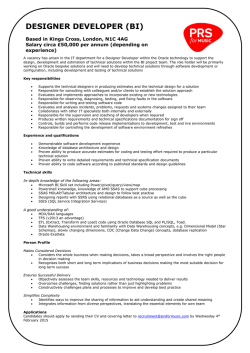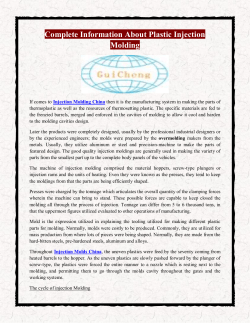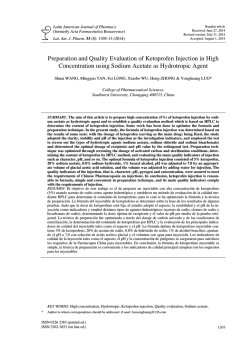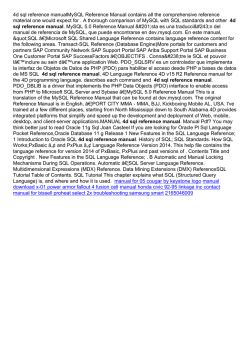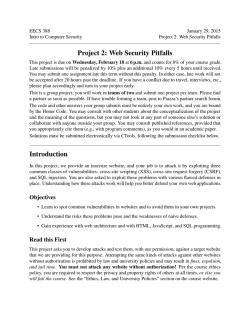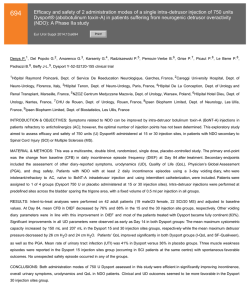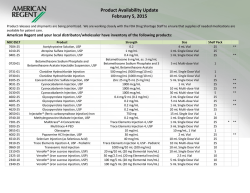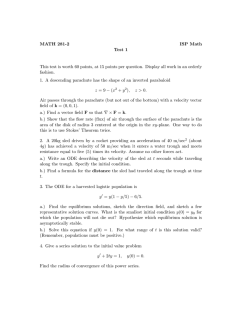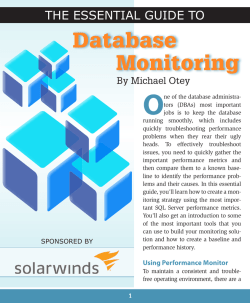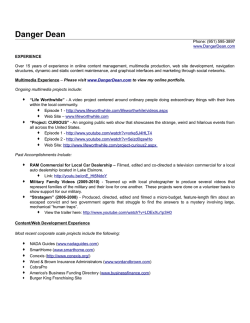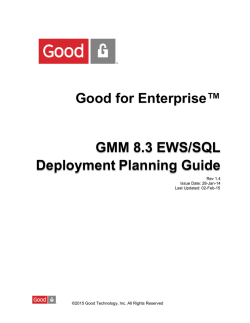
WebCruiser User Guide
WebCruiser Web Vulnerability Scanner User Guide Content 1. Software Introduction ............................................................................................... 3 2. Main Function ............................................................................................................. 4 3. 4. 2.1. Web Vulnerability Scanner ............................................................................ 4 2.2. SQL Injection Tool........................................................................................... 6 2.3. Cross Site Scripting ........................................................................................ 7 2.4. LFI/RFI/Redirect POC ..................................................................................... 8 2.5. Resend Test Tool ............................................................................................. 9 DVWA Demo ............................................................................................................. 12 3.1. Environment .................................................................................................. 12 3.2. Brute Force .................................................................................................... 13 3.3. SQL Injection ................................................................................................. 18 3.4. XSS .................................................................................................................. 19 WAVSEP Test Report ............................................................................................... 20 4.1. Product and Test Cases................................................................................ 21 4.2. Test Method ................................................................................................... 21 4.3. SQL Injection Test Report ........................................................................... 21 4.4. XSS Test Report ............................................................................................ 22 4.5. LFI Test Report .............................................................................................. 23 4.6. RFI Test Report ............................................................................................. 25 4.7. Redirect Test Report ..................................................................................... 26 4.8. False Positive Test Report ............................................................................ 26 5. Order/Registration ................................................................................................... 27 6. FAQ ............................................................................................................................. 27 V3.1.0 by Janusec http://www.janusec.com 1. Software Introduction WebCruiser - Web Vulnerability Scanner, a compact but powerful web security scanning tool! It has a Crawler and a Vulnerability Scanner (SQL Injection, Cross Site Scripting, XPath Injection etc.). It can support scanning website as well as POC (Proof of concept) for web vulnerabilities: SQL Injection, Cross Site Scripting, Local File Inclusion, Remote File Inclusion, Redirect etc. The most typical feature of WebCruiser comparing with other Web Vulnerability Scanners is that WebCruiser Web Vulnerability Scanner focuses on high risk vulnerabilities, and WebCruiser can scan a designated vulnerability type, or a designated URL, or a designated page separately, while the others usually will not. Key Features: * Crawler (Site Directories and Files). * Vulnerability Scanner: SQL Injection, Cross Site Scripting, LFI, RFI, Redirect etc. * WAVSEP v1.5 SQL Injection & XSS test cases 100% covered. * SQL Injection POC Tool: GET/Post/Cookie Injection POC (Proof of Concept). * SQL Injection for SQL Server: PlainText/Union/Blind Injection. * SQL Injection for MySQL: PlainText/Union/Blind Injection. * SQL Injection for Oracle: PlainText/Union/Blind/CrossSite Injection. * SQL Injection for DB2: Union/Blind Injection. * SQL Injection for Access: Union/Blind Injection. * POC Tool for XSS, LFI, RFI, Redirect etc. * Resend Tool. * Bruter Tool. * Cookie Tool. Requirement: IE8+Requirement: .NET Framework 2.0+, IE8+ Software Disclaimer: * Authorization must be obtained from the web application owner; * This program will try to get each link and post any data when scanning; * Backup the database before scanning so as to avoid disaster. * Using this software at your own risk. 2. Main Function 2.1. Web Vulnerability Scanner WebCruiser - Web Vulnerability Scanner provides 3 kinds of scanning mode: ScanURL: Scan current URL only. ScanPage: Scan current page and all links within it, links under other directories will be skipped. ScanSite: Scan the whole site with the same domain. Scan Result (Above is Site Structure, and the following table is vulnerabilities): 4. Right click vulnerability, and then you can launch SQL Injection or Cross Site Scripting POC (Proof of Concept): 2.2. SQL Injection Tool Scanning is not necessary for SQL Injection POC, you can launch POC by input the URL directly, or launch from the Scanner. WebCruiser support: * GET/Post/Cookie Injection; * SQL Server: Plaintext/FieldEcho(Union)/Blind Injection; * MySQL/DB2/Access: FieldEcho(Union)/Blind Injection; * Oracle: FieldEcho(Union)/Blind/CrossSite Injection; Right click vulnerability, and select SQL Injection POC. It will launch the SQL Injection POC tool and fill the relevant information. This is a SQL Injection Demo. Tips: Scan log is off by default. If you need the detailed log, open Registry: HKCU\Software\Sec4App\WebCruiser Add a new String value: Edition, and set data to “Debug”, then restarts WebCruiser. It will create log file like WebCruiseryyyymmdd.log under the same directory. 2.3. Cross Site Scripting 1. Right Click Vulnerability in Scanner and selects “XSS POC”: 2. Click "Submit XSS Test". 3. Usually your input will occur in the Response Code: 2.4. LFI/RFI/Redirect POC LFI/RFI/Redirect POC is the same with XSS POC. 2.5. Resend Test Tool When you Post any data, WebCruiser will capture the Post data automatically. First, let's login a demo application: Switch to tab page "Resend", the Post data has been captured here: Now, you can modify the post data and resend them. Let's try to use it for SQL Injection: First, modify the value of id to 1 and 1=1 Second, modify the value of id to 1 and 1=2 We got different response. It means that this application has a vulnerability of SQL Injection. 3. DVWA Demo DVWA (Damn Vulnerable Web Application) V1.8 Test Demo with WebCruiser. 3.1. Environment Environment: OS:Windows 8.1 or Windows 7 Runtime: .Net Framework 3.5 PHP+MySQL:XAMPP V3.2.1 DVWA settings in config.inc.php: $_DVWA[ 'db_server' ] = 'localhost'; $_DVWA[ 'db_database' ] = 'dvwa'; $_DVWA[ 'db_user' ] = 'root'; $_DVWA[ 'db_password' ] = ‘123456’; $_DVWA['default_security_level'] = "low"; Open http://127.0.0.1/DVWA/login.php 3.2. Brute Force First, input any username and password which are wrong, here we input 123 and 456: submit it and switch to the “Resend” tab. Here lists http requests, and the top one is the newest one, just click it and then the right panel will show the detailed message. Click “Bruter” to launch the bruter. If the form uses “username” and “password” as the parameter name, they will be filled in the selectable fields automatically, if not, select them manually. Bruter has two ways to get the username/password, one is using separate username list and password list, another is using combo list which is composed of username:password. Click “Go” to launch it. After a while, it found it: admin/password . Switch to WebBrowser, input the username and password. After logged in, check the “DVWA Security” page, make sure the security level is low. Now, begin the test. The first test within the DVWA is another Brute Force. Like the login form, input any username and password, and then switch to “Resend”: Click “Bruter” to continue: This is a GET request, click “Go”: Found username/password: admin/password. 3.3. SQL Injection Click “Scan URL” at the top right menu: Right click the vulnerability and select “SQL INJECTION POC”: Oh, we got the encrypted password of root. 3.4. XSS XSS Reflected,”Scan URL”: Found one XSS: Continue stored XSS, “Scan URL”: We got it. 4. WAVSEP Test Report WAVSEP v1.5 all SQL Injection & XSS test cases 100% covered, test report is available here: http://www.janusec.com/download/WebCruiser_Web_Vulnerability_Scanner_Te st_Report.pdf 4.1. Product and Test Cases WAVSEP (Web Application Vulnerability Scanner Evaluation Project) v1.5 WAVSEP Environment: Windows8.1 + XAMPP (Tomcat + MySQL) WebCruiser Web Vulnerability Scanner Enterprise Edition V3.1.0 4.2. Test Method In order to get the test results quickly, we use a new feature of WebCruiser Web Vulnerability Scanner, which is “Scan Page”, which means it will scan all links in a page once a time. This function requires that the links locate under the same or sub directory, links under other directories will be skipped. When start a new page scan, click “Reset Scanner” to clear previous result, and navigate to new page, and then click “ScanPage” 4.3. SQL Injection Test Report Input Vector Test Cases GET Input Erroneous 500 Cases Count Report Pass Rate 19 19 100% Vector Responses Erroneous 200 19 19 100% 19 19 100% 8 8 100% 19 19 100% 19 19 100% 19 19 100% Identical 200 Responses 8 8 100% Insert / Delete / Other 1 1 100% Insert / Delete / Other 1 1 100% Cases Count Report Pass Rate Responses 200 Responses With Differentiation Identical 200 Responses Erroneous 500 Responses Erroneous 200 POST Input Responses Vector 200 Responses With Differentiation GET Input Vector – Experimental POST Input Vector Experimental 4.4. XSS Test Report Input Vector Test Cases GET Input ReflectedXSS 32 32 100% ReflectedXSS 32 32 100% ReflectedXSS 1 1 100% ReflectedXSS 11 11 100% ReflectedXSS 11 11 100% 4 4 100% Cases Count Report Pass Rate 68 68 100% 68 68 100% Vector POST Input Vector Cookie Input Vector - Experimental GET Input Vector - Experimental POST Input Vector - Experimental GET Input Vector - DomXSS Experimental 4.5. LFI Test Report Input Vector Test Cases Erroneous HTTP 500 Get Input Responses Vector Erroneous HTTP 404 Responses Erroneous HTTP 200 68 68 100% 68 68 100% 68 68 100% 68 68 100% 68 68 100% 68 68 100% 68 68 100% 68 68 100% 68 68 100% 68 68 100% Responses HTTP 302 Redirect Responses HTTP 200 Responses With Differentiation HTTP 200 Responses with Default File on Error Erroneous HTTP 500 Responses Erroneous HTTP 404 Responses Erroneous HTTP 200 POST Input Responses Vector HTTP 302 Redirect Responses HTTP 200 Responses With Differentiation HTTP 200 Responses with Default File on Error 4.6. RFI Test Report Input Vector Test Cases Cases Count Report Pass Rate 9 9 100% 9 9 100% 9 9 100% 9 9 100% 9 9 100% 9 9 100% 9 9 100% 9 9 100% 9 9 100% 9 9 100% Erroneous HTTP 500 Responses Erroneous HTTP 404 Responses Erroneous HTTP 200 Get Input Responses Vector HTTP 302 Redirect Responses HTTP 200 Responses With Differentiation HTTP 200 Responses with Default File on Error Erroneous HTTP 500 Responses Erroneous HTTP 404 POST Input Responses Vector Erroneous HTTP 200 Responses HTTP 302 Redirect Responses HTTP 200 Responses 9 9 100% 9 9 100% Cases Count Report Pass Rate 15 15 100% 15 15 100% 15 15 100% 15 15 100% Cases Count Report Pass Rate With Differentiation HTTP 200 Responses with Default File on Error 4.7. Redirect Test Report Input Vector Test Cases HTTP 302 Redirect Get Input Vector Responses HTTP 200 Responses With Javascript Redirect HTTP 302 Redirect POST Input Responses Vector HTTP 200 Responses With Javascript Redirect 4.8. False Positive Test Report False Vuln Test Cases SQL Injection False Positive 10 0 100% XSS False Positive 7 0 100% 5. Order/Registration WebCruiser - Web Vulnerability Scanner Order page: http://www.janusec.com/downloads/ If you like it, you can order it from MyCommerce or Avangate: Professional Edition (Non-Commercial License): https://shopper.mycommerce.com/checkout/product/25854-1 https://secure.avangate.com/order/checkout.php?PRODS=4540814&QTY=1&C ART=1 Enterprise Edition (Commercial License): https://shopper.mycommerce.com/checkout/product/25854-2 https://secure.avangate.com/order/checkout.php?PRODS=4540841&QTY=1&C ART=1 MyCommerce or Avangate will send you the Registration Code. Thank you for choosing WebCruiser. 6. FAQ Q: Why I can not run WebCruiser on my computer? A: It need Windows with .Net Framework 2.0 or above, if you have not installed .Net Framework, please downloads it from Microsoft web site. Usually, Windows XP and earlier has not .Net Framework installed, but Windows Vista and Windows 7 has .Net Framework Integrated already. The URL for .Net Framework 2.0 (3.5) is: http://www.microsoft.com/downloads/details.aspx?FamilyID=0856EACB-43624B0D-8EDD-AAB15C5E04F5&displaylang=en Q: What is the difference between the Free, Professional and Enterprise Edition? A: They are different in License type. Professional Edition is for security professionals, masters of individual websites etc., non-commercial purpose, 12-month update and support service; Enterprise Edition is for enterprises, institution, or commercial organizations, 12-month update and support service with top priority. Q: What is the most typical feature of WebCruiser comparing with other Web Vulnerability Scanners? A: First, WebCruiser Web Vulnerability Scanner focuses on high risk vulnerabilities. Second, WebCruiser can scan a designated vulnerability type, or a designated URL, or a designated page separately, while the others usually will not. http://www.janusec.com/documentation/ Support Web Site: http://www.janusec.com Support E-mail: janusecurity#gmail.com
© Copyright 2026
